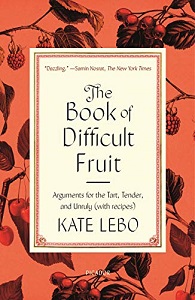
Fruit might be considered difficult because it’s hard to grow, arduous to prepare, almost impossible to buy or else fraught with emotional associations.
Kate Lebo’s talent lies in weaving her personal fascination with the various fruits — and a couple of non-fruits such as wheat and sugarcane — with her efforts to use it in some way. Every chapter has at least one recipe. I’m most tempted to try making huckleberry pie, juniper bitters, pickled rhubarb, and whipped vanilla body cream. She explores historical uses, native habitat and growing requirements. However, the entries are not encyclopedic. Instead, each entry is also an opportunity to remember and reflect on her personal relationships, her own and others’ health challenges and the foods used to manage those challenges.
While preparing for her grandfather’s funeral she discovers an elderberry shrub covered in fruit in her parents’ backyard. She also discovers a missing set of aunts. She includes a recipe for elderflower cordial and throughout the book the mystery of the missing aunts reveals a confounding secret in her own family.
In the chapter on dandelions, filed under F for “faceclock,” an old common name, we learn a little about folklore and childhood rituals of blowing seeds off the puffy seedheads. We also learn how Lebo would weed her dandelion-choked lawn when depression prevented her from doing anything else. The recipe for faceclock greens, fennel sausage and barley soup is recommended for early spring preparation and sounds delicious.
Nothing makes a librarian happier than to help a patron find answers to questions within the books we’ve spent years curating. Even better is when that Spokane, Washington based patron writes a book filled with those answers and recalls the hours she spent researching in the Miller Library (in the chapter on juniper berries). Kate Lebo’s book of essays is compelling, sometimes humorous, and always insightful.
Published in the Leaflet, Volume 8, Issue 12, December 2021